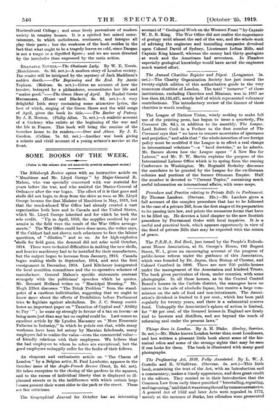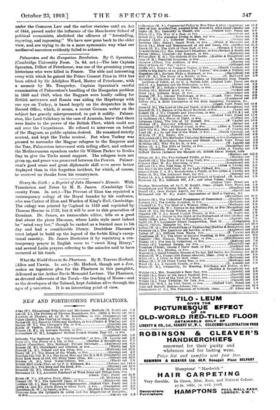SOME BOOKS OF THE WEEK.
[Nonce in this edition does not ntottattarily proluds eubsegnent mint.] The Edinburgh Review opens with an iwerructive article on " Munitions and Mr. Lloyd George " by Major-General R. Mahon, who was specially concerned with war material for years before the war, and who assisted the Master-General of Ordnance after the war began. The effect of it is that guns and shells did not begin to drop from the skies as soon as Mr. Lloyd George became the first. Minister of Munitions in May, 1915, but that the much-abused War Office had already created a vast organization both here and in Canada and the United "States, which Mr. Lloyd George inherited and for which he took the sole credit. " Up to April, 1916, the supplies received by our armies in the field were the result of the War Office arrangements." The War Office could have done more, the writer says, If the Cabinet had not shown such reluctance to face the labour questions, of " dilution " and so on. As for high-explosive 'shells for field guns, the demand did not arise until October, 1914. There were technical difficulties in making the new shells, and heavier machinery had to be installed •for their manufacture, but the output began to increase from January, 1915. Canada began making shells in September, 1914, and sent the first consignment in December, 1914. Lord Kitchener inaugurated the local munition committees and the co-operative schemes of manufacture. General Mahon's specific statements contrast strangely with the politicians' speeches which he quotes. Mr. Bernard Holland writes on " Municipal Housing." Mr. Hugh Elliot discusses " The Drink Problem " from the standpoint of s, cautious individualist, suggesting that we ought to know more about the effects of Prohibition before Parliament tries to legislate against alcoholism. Dr. J. C. 'Stamp contributes an important paper on " Taxation of Capital and ' Ability to Pay ' " ; he sums up strongly in favour of a tax on income as being more just than any tax on capital could be. Last comes an excellent article by Sir Lyndon Macassey on " More Economic Fallacies in Industry," in which he points out that, while many workmen have been led astray by M.arxian falsehoods, many employers fail to realize the value—even the commercial value— of friendly relations with their employees. We believe that the bad employers to whom he refers are exceptional, but the good employers unhappily suffer for the faults of their fellows.
An eloquent and enthusiastic article on " The Charm of London " by a Belgian artist, M. Paul Lambotte, appears in the October issue of the Anglo-French Review (Dent, 2s. &I. net). He takes exception to the closing of the gardens in the squares, and to the excess of individual liberty that is displayed in illplanned streets or in the indifference with which certain large houses present their.worst.sides to the park or the street. These are fair criticisms.
The Geographical Journal for October has an interesting account of " Geological Work on the Western Front "-by -Captain W. B. R. King. The -War Office did. not realize the -importance of geology until almost the end.of the war, and the whole work of advising the engineers and tunnelling companies devolved upon Colonel David of Sydney, lieutenant Loftus Hills, and Captain King himself, whereas the enemy had thirty ,geologists at work and the Americans had seventeen. In Flanders especially geological knowledge would have saved the engineers much wasted effort.
The Annual Charities Register and Digest. (Longmans. 5s. net.)---The Charity Organization Society -has just issued the twenty-eighth edition of this authoritative -guide to the very numerous charities of London. The total " turnover " of these institutions, excluding Churches and Missions, was in 1917 no less -than £8,135,427, nearly half of which represented voluntary contributions. The introductory review of the finance of these charities is worth reading.
The League of Nations Union, wisely -seeking to make full use of the printing press, has begun to issue a quarterly,'The Covenant (3s. 6d.), -in addition to its monthly, The League. Lord Robert Cecil in a Preface to the 'first number of The Covenant says that "we have to remove mountains of ignorance and prejudice," and adds that " the wholeintention of our foreign policy must be-modified if the League is to effect a real change in international relations "—a " hard 'doctrine," as he admits. Mr. Barnes shows how the League opens " A New Era for Labour,' and Mr. P. W. Martin explains the -purpose of -the International Labour Office which is to spring from •the coming Conference in Washington. Mr. -Reginald Berkeley, discusses the mandates to be granted by the League for the ex-German colonies and portions of the former Ottoman Empire. Half the number is devoted to " Current Topics," containing much useful information on international affairs,-with-some maps.
Procedure and Practise relating to Private Bills in Parliament. By Thomas Landers. (Stevens. 32s.)—Mr. Landers gives a full account of the complex procedure that has to be followed in the ease of a private Bill, from the first stages of its preparation to its passing, into law, and prints the numerous forms that have to be filled up. He devotes a brief chapter to the new Scottish procedure by Provisional Order with local inquiries. It -is, a useful and practical book, which appears opportunely in view of the flood of• private Bills that may be expected with the return of peace.
The P.R.H.A. Red Book, just issued by the People's Refreshment House Association, at St. George's House, 193 Regent Street, W. 1, gives an encouraging account of the progress of public-house reform under the guidance of this Association, which was founded by Dr. Jayne, -then Bishop of Chester, and Colonel Craufurd in 1896. There are now 250 public-houses _under the management of the Association and kindred Trusts. The book gives particulars of them, under counties, -with some photographs. In all these houses, as in -the Central Control Board's houses -in the Carlisle district,the managers have no interest in the sale of alcoholic liquor, but receive a large 'commission on the sale of food and non-intoxicants. The Association's dividend is limited to 5 per cent., which has been paid regularly for twenty years, and there is a substantial reserve fund. Unhappily the Association's sphere of action is limited, for " 80 per cent. of the licensed houses in England are firmly tied to brewers and distillers, and are beyond the reach of reforming zeal under the present laws."
Things Seen in London,. By A. H. Blake. (Seeley, Service. net.)—Mr. Blake knows London better than meet Londoners, and has written a pleasant little book about some -of the historical relics and some of the strange sights that may be-seen if one looks for them. The book is illustrated with-many.good photographs.
The -Profiteering Act, 1919, Fully Annotated. By L. W.., J. Costello and R. O'Sullivan. (Stevens. es. net.)This little book, containing the text of the Act, with an Introduction and a commentary, makes a timely appearance, and does great credit to the editors. They _remind us in their Introduction that the Common Law from early times punished "forestalling, regrating, and ingroasing,"_and thatit wasstrengthened by numerous statutes. A general Act of 1552 and later Acts were repealed in 1772, mainly at the instance of Burke, but offenders were prosecuted wader the Common Law and the earlier statutes' until an Act of 1844, passed under the influence of the Manchester School of political economists, abolished the offences of " forestalling, regrating, and ingrossing." We have no gone back to the older view, and are trying to do in a more systematic way what our mediaeval ancestors evidently failed to achieve.
Palmerston and the Hungarian Revolution. By C. Sproxton. (Cambridge University Press. 7s. 6d. net.)—The late Captain Sproxton, Fellow of Peterhouse, was one of the promising young historian& who were killed in France. The able and interesting essay with which he gained the Prince Consort Prize in 1914 has been edited by Sir Adolphus Ward, Master of Peterhouse, with a memoir by Mr. Temperley. Captain Sproxton's careful examination of Palmerston's handling of the Hungarian problem in 1848 and 1849, when the Magyars were loudly calling for British assistance and Russia was aiding the Hapsburgs with one eye on Turkey, is based largely on the despatches in the Record Office, which, it seems, a recent German writer on the subject has gravely misrepresented, to put it mildly. Palmerston, like Lord Salisbury in the case of Armenia, knew that there were limits to the power of the British Fleet, which could not sail over the Carpathians. He refused to intervene on behalf of the Magyars, as public opinion desired. He remained strictly neutral, and kept the Turks neutral. But when Turkey was pressed to surrender the Magyar refugees to the Emperor and the Tsar, Palmerston intervened with telling effect; and ordered the Mediterranean squadron under Sir William Parker to Besika Bay to give the Turks moral support. The refugees were not given up, and peace was preserved between the Powers. Palmerston's good sense and great diplomatic skill were never better displayed than in this forgotten incident, for which, of course, he received no thanks from his countrymen.
Henry the Sixth s a Reprint of John Blacman'e Memoir. With Translation and Notes by M. R. James. (Cambridge University Press. 5s. net.)—The Provost of Eton has reprinted a 3ontemporary eulogy of the Royal founder by his confessor, who was Cantor of Eton and Warden of King's Hall, Cambridge. The eulogy was printed by Copland in 1510 and reprinted by Thomas Hearne in 1732, but it will be new to this generation of Etonians. Dr. James, an immaculate editor, tells us a good deal about the pious Blacman, whose Latin style •must indeed be "rated-very low," though he ranked as a learned man in his day and had a considerable library. Doubtless Blaoman's tract helped to build up the legend of the feeble King's exceptional sanctity. Dr. James illustrates it by reprinting a contemporary prayer in English verse to " sweet King Henry," and several. Latin prayers referring to the miracles said to have occurred at his tomb.
What the World Owes to the Pharisees. By R. Travers Herford. (Allen and Unwin. Is. net.)—Mr. Herford, though not a Jew, makes an ingenious plea for the Pharisees in this pamphlet, delivered as the Arthur Davis Memorial Lecture. The Pharisees,as devoted adherents of the Torah—the teaching of Moses—and as the developers of the Talmud, kept Judaism alive through the ages of p ‘rsecution. It is an interesting point, of view-.











































 Previous page
Previous page